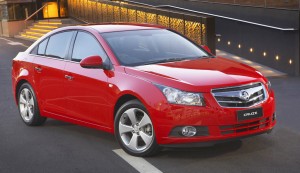
Holden offers a diesel in its version of the Cruze sedan. A website says that GM is now preparing to bring the diesel to the U.S. market.
For years, executives for the Big Three automakers have said that there wasn’t a viable business case for a small diesel car in the U.S.
Now it appears General Motors is planning to test the waters with a diesel slated for the 2013 Chevrolet Cruze.
GM Inside News quoted unnamed sources at the Lordstown, Ohio, assembly plant that produces the Cruze as saying that management had informed them that a diesel would be added to the Cruze lineup beginning next year.
The website added that its sources also said that the engine would be a 2.0-liter four cylinder. Power output and fuel economy have not been determined.
Presumably, the diesel that will find its way into the North American Cruze is related to the 2.0-liter diesel in the Australian version, which is known as the Holden Cruze. That engine produces 147 horsepower and 235 foot-pounds torque and is rated at the equivalent of 34 mpg in combined driving. It’s unknown where GM would source the engine from.
GM product czar Tom Stephens said in September speech at an powertrain technology conference that the automaker was reversing course on its plan to offer a diesel sedan, but offered no details on the model. Click here to read more about Stephens’ comments.
While Ford and GM both sell small diesels in Europe and Volkswagen has successfully marketed them in the U.S., the domestic automakers have been reluctant to try diesels in anything other than heavy-duty full-size pickup trucks, where the engines are staples.
For example, Ford President of the Americas Mark Fields has said importing its diesel for the Focus is not financially feasible and sales likely wouldn’t justify the investment to build it in North America.
But with fuel prices expected to rise – possibly approaching $5 for a gallon of gasoline in 2012 – many observers see diesels as the best choice for improved fuel mileage, at least in the short term.
While hybrids, extended-range electric vehicles and pure EVs have garnered a lot of media attention recently, the fact remains that those vehicles are best suited for urban driving, not the suburban freeway driving of many Americans.
But drivers in the U.S. still have difficult memories of past domestic diesels aimed at the car market. In particular, GM’s early ‘80s diesels left many with the impression that diesels are less durable than gasoline engines, something the rest of the world knows isn’t true.
